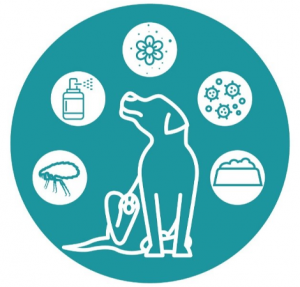Time to read: 5 mins
Allergies or allergic dermatitis is caused when your pet’s immune system is triggered by an allergen. To most pets these allergens are harmless, but some pets may have an extreme reaction to them. Some pets are affected by allergies all year round while other are only itchy at particular times of the year, similar to some of us suffering with hay fever. Often it is not possible to find the single trigger of the allergy but as the pet owner you may suspect a particular event to have been the cause of the allergy.

Common allergens in pets
- Flea/insect bites
- Pollen
- Trees
- Grass
- House dust mites
- Household products
- Certain foods
Common signs of allergies
- Itchy skin
- Licking or biting one area
- Rashes
- Fur loss
- Scabs
- Itchy/runny eyes
Top Tips to help your pet with allergies
Here are some simple steps you can take at home to improve your pet’s skin health.
- Ensure all of the pets in the house are treated for fleas every month all year round. It’s best to consult your vet who can advise the best treatment and use a household flea spray. This will kill any fleas and help to control house dust mites too.
- Vacuum regularly to reduce dust and mites.
- Clean your pet’s bed regularly and rinse well so your dog doesn’t react to any soap/powder residue
- Use a vet recommended supplement to reduce itchy skin. Identifying the cause of itchy skin can take time but itch relief can be provided whilst investigations is underway.
- For pets that are sensitive to pollen and other outdoor irritants it is best to avoid walking through tall grasses or meadows, particularly during spring and autumn when pollen counts are higher. Try to tailor your daily walks to times when the pollen count is lowest, this is normally between 5 and 10am.
- Every time your pet goes outside, wipe their feet with a damp towel before they come inside. This can help prevent pollen and other irritants being brought into the home.
- Always follow your vet’s recommendation about recheck appointments.
- Avoid your pet coming into contact with anything that you suspect is an allergy trigger.
- In the case of skin allergies, treatment is likely to be more about long-term management and prevention rather than finding a cure. Many pets live on long-term anti-itch medication.
- Food allergies or intolerances can be tested for by carrying out a dietary exclusion trial. This involves feeding your pet an alternative diet for a period of 6-8 weeks. The choice of food is very important, and your vet will advise you on the most appropriate diet to use.
If you have any pet related questions, be sure to contact our registered veterinary nurses through the Careline. They will be able to assist you with any of the questions you may have.









